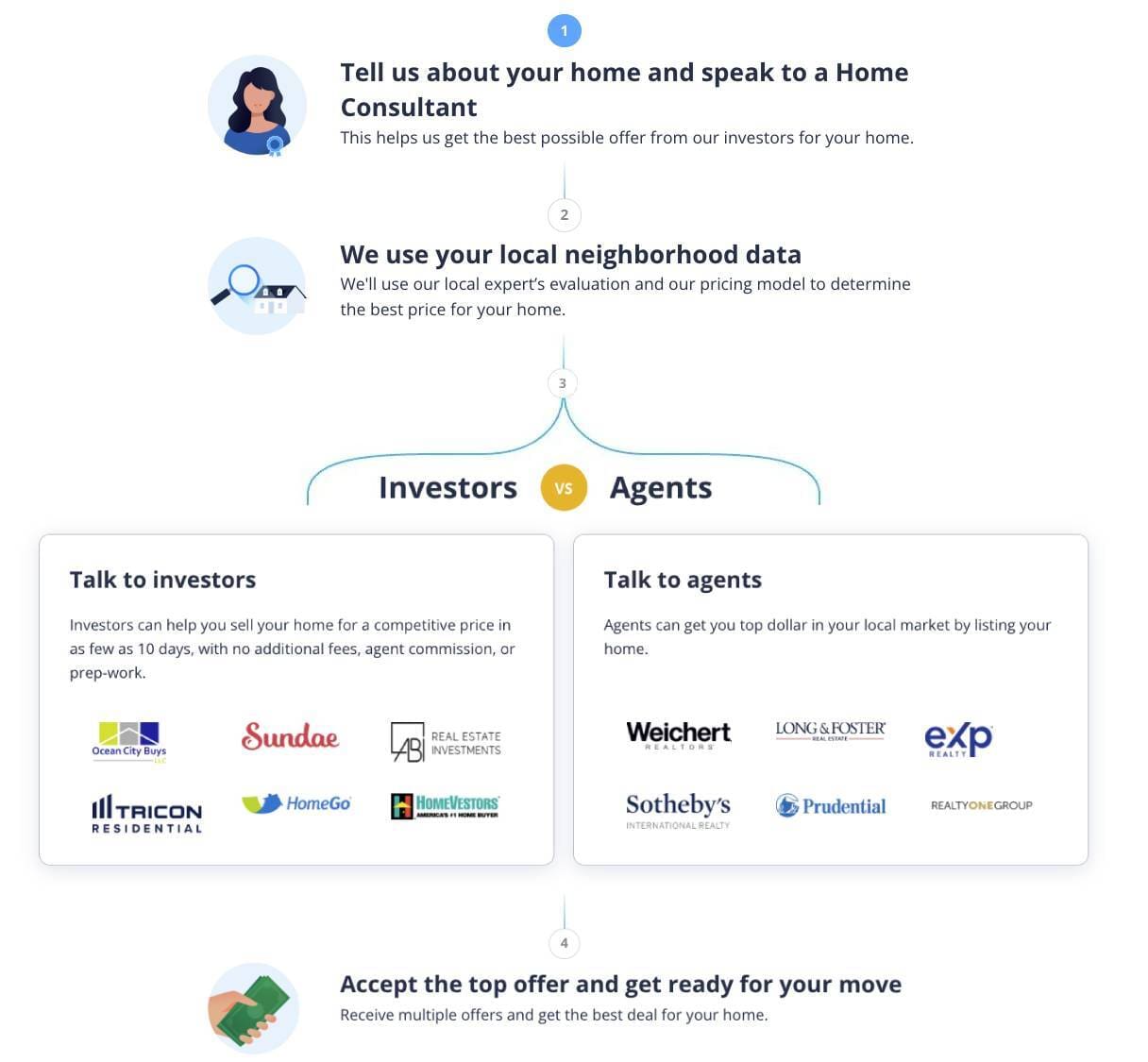7 Tips and Tricks to Sell Your House Virtually (Or With Minimal Contact)
- Published on
- 5 min read
-
 Valerie Kalfrin, Contributing AuthorClose
Valerie Kalfrin, Contributing AuthorClose Valerie Kalfrin Contributing Author
Valerie Kalfrin Contributing AuthorValerie Kalfrin is a multiple award-winning journalist, film and fiction fan, and creative storyteller with a knack for detailed, engaging stories.
-
 Sam Dadofalza, Associate EditorClose
Sam Dadofalza, Associate EditorClose Sam Dadofalza Associate Editor
Sam Dadofalza Associate EditorSam Dadofalza is an associate editor at HomeLight, where she crafts insightful stories to guide homebuyers and sellers through the intricacies of real estate transactions. She has previously contributed to digital marketing firms and online business publications, honing her skills in creating engaging and informative content.
Imagine catching the attention of hundreds, maybe thousands, of potential buyers when you sell your home. No, you don’t need to advertise on billboards or take out expensive ads to get that kind of marketing exposure. By knowing a few tips and tricks to sell your home virtually, you can reach a wide audience.
By showcasing your home through high-quality photos, online walkthroughs, and detailed listings, you’ll attract more eyes and create more opportunities for offers. It makes your home more accessible to buyers near and far and allows them to explore all the details they need to make a decision anytime.
Tips and tricks to sell your home virtually
From virtual tours and online consultations to 3D floor plans, real estate agents offer home sellers more resources and convenience than ever — and they sell homes successfully. In some cases, they can even complete transactions without ever meeting their clients in person. At a time when convenience is key, selling a home virtually has become a real game-changer.
“What’s my seller comfortable with?” says Suzanne Damon, a top-selling agent in Manchester, New Hampshire, noting that one told her: “I have to sell because I have to move, but Suzanne, I really don’t want to see you.” Her response? “OK. Let’s talk about how to make this happen for you.”
She had the same flexibility with buyers, asking, “‘How comfortable will you be buying something that you haven’t seen, touched, felt, and smelled?’ Because we buy on our senses.”
If you’re selling a home and want to minimize human contact — whether for convenience, privacy, health and safety, or cost savings — the key is to leverage technology. You might be surprised at how easily you can sell your house virtually without sacrificing the customer service or pricing you expect.
1. Find an agent you trust
Communication becomes incredibly vital when you prefer not to meet buyers face to face, says Jeremy Kahler, a top-selling agent in Rapid City, South Dakota who has done a “decent amount” of virtual transactions over the years, especially during the pandemic.
At the beginning of the health outbreak, when military travel stopped, he shared that he had sold at least three homes virtually, including one for a New York City doctor and his family who had planned to move out West in July.
“They were going to make a trip out here to look at homes, and then all the COVID-19 hit, and obviously that was canceled,” Kahler says. “So then we decided, OK, we’re gonna do it all remotely.”
If you want to sell your home with little contact with buyers, you need an agent experienced in virtual transactions. A skilled agent can guide you through the process using technology such as virtual tours, online consultations, and digital contracts, ensuring a smooth experience without in-person interactions.
Keep in mind that homebuyers usually spend about 10 weeks searching for a home and view an average of seven properties, two of which they typically view online before deciding to visit in person. By working with an agent skilled in enhancing your home’s virtual presence, your home can capture the attention of buyers early in their search, giving you an edge in the competitive market.
Whether you find an agent through a resource like HomeLight or another means, Kahler advised interviewing them about their previous experience with virtual transactions.
- What virtual tools and programs do you use?
- What’s your marketing plan?
- How will they keep in contact with potential buyers as well as vendors and you?
Also, what’s your timeline and your comfort level? “I think probably the biggest thing is to make sure that there are means to continue to market the home [regardless of the circumstances], and provide a way for buyers to have a good view of the property, the layout, and to be able to make a decision,” Kahler says.
Find an agent who can help you sell safely.
We analyze millions of home sales to find top agents in your area.
2. Skip showings by selling for cash
Before you put any more work into listing your home on the open market, do a quick gut check: Does the idea of having strangers come through your house for showings make your stomach churn? Are you comfortable having someone over advising you on how to stage rooms and re-arrange your furniture? Some sellers who value privacy and want to avoid stress may not be comfortable with such arrangements.
Those a bit more wary about the showings process can consider the alternative to a traditional listing process: selling your house for cash. Most cash buyers are only interested in purchasing off-market homes, meaning you
can skip showings and stagings entirely.
HomeLight’s Simple Sale platform makes it easy and safe to receive convenient, no-obligation cash offers. It connects you to one of the largest networks of cash buyers in the U.S. and features a straightforward four-step process:

Sell Your House Virtually to an iBuyer
Our network of pre-approved real estate buyers prefer to buy homes off-market — which means you can skip the listing process if it makes you nervous.
3. List your home remotely
Using a videoconferencing platform such as Zoom, GoToMeeting, Skype, or Google Hangouts, agents can conduct virtual consultations in which sellers walk them through their properties so they can get a sense of the layout.
You might have to take your own photos or video, which the agent can have edited, or leave the home for a real estate photographer (wearing gloves and masks) to do the job.
“The seller has all the lights on and everything ready for photos,” Kahler says, adding that the photographer touches as little as possible.
“It’s basically getting in the front door, and then they go through, shoot the house, leave, and we’re ready to go.”
Cheesette Cowan, a top-selling real estate agent in Tampa, Florida, who specializes in relocations and investment properties, says meeting with clients virtually for listing appointments has allowed her to free up more time.
“I’ve had listing appointments with people on their iPhone FaceTiming. And I’m like, ‘Why wasn’t I doing this before?’” she says, noting that typically, she would have driven 45 minutes to view a property in person. Now she’s looked through a seller’s livestream or photos, researched online to set a price, and sent listing papers to the seller electronically.
She shared how, during the pandemic, she managed multiple listings and contracts without ever leaving her home. This experience led her to adopt a fully virtual listing process in her business.
4. Leverage social media
Social media is an excellent tool for spreading the word about your home because it allows you to reach a wide, targeted audience. Here’s a quick overview of how you can use the top platforms:
- Facebook: Post detailed listings, virtual tours, and photos and use Facebook Marketplace for added exposure. If the budget allows, run ads to target specific audiences.
- Instagram: Share high-quality photos, stories, and reels. Maximize Instagram’s features, such as location tags and relevant hashtags, to reach a broader audience.
- Nextdoor: Tap into your local community by posting your listing and engaging with neighbors. Nextdoor is perfect for word-of-mouth marketing and reaching buyers looking nearby.
5. View it as if buyers were there
Declutter your home on your own or consult with a professional stager to make it look its best. Trisha Roe of Designing Impressions, a licensed professional stager for two decades in Sturgis, South Dakota, who works with Kahler, has done virtual consultations either from the driveway of a client’s home via a tablet or from her house.
She asks the homeowner to walk her through the property and provides advice on rearranging the furniture and clearing out clutter without entering the home.
Kahler says he records a detailed video tour for buyers where he points out the home’s features and any flaws. “I am very, very cautious on pointing out any little flaws that I see … because on video, obviously, you don’t get as much of the fine detail of a home.”
Agents also can provide three-dimensional interactive property scans through platforms such as Matterport, Cupix, and EyeSpy360. Immoviewer and FloorPlanOnline provide virtual showings and 3D 360-degree video tours. BombBomb has video check-ins to stay in touch with prospects.
During the height of the pandemic, Tom Hall, a top-selling agent in Oklahoma City, used Facebook Watch Parties instead of traditional open houses to showcase homes and answer live questions. Today, Facebook Live has become the go-to tool, enabling sellers and agents to engage with potential buyers in real-time, offering a dynamic, virtual experience.
Damon says her office’s website allows interested buyers to click on a calendar for a virtual tour alongside an agent. “We’ll sit down and go slide by slide and consult with you,” she says. “If that’s a good fit, let’s take it to the next step. Eventually, they’re going to have to get in that house.”
6. Get your home inspected — with modifications
Before closing, you’ll still need to have a home inspector view the property inside and out (a common contract contingency) or provide a home warranty to cover any structural damage or breakdowns in appliances, such as the furnace or refrigerator.
But agents say that a homeowner doesn’t have to be present for such inspections. Agents can open the property and remain outside while the inspector works.
“I think the important thing is just ask, ‘What is your protocol?’ and if they don’t have a protocol in place, that you give them yours,” Damon says.
If you don’t have the time to meet inspectors in person, ask them if they can send their reports and photographs, and review the findings via phone or virtual meeting.
7. Assess home value
Most sellers get an appraisal before listing to ensure their home is priced right. If you want to forgo the in-person assessment, you can opt for alternative appraisals, such as exterior inspections, drive-bys, a homeowner’s video walk-through, or a home inspector’s report. All of these assess the property’s condition and value without requiring a full in-person appraisal.
You can gauge your home’s worth before such an appraisal using online tools such as HomeLight’s Home Value Estimator, powered by multiple sources and current market trends, and your agent’s comparative market analysis (CMA).
8. Vet buyers and offers
When selling your home virtually, limiting interactions to serious buyers helps streamline the process and reduce unnecessary contact. Here are some strategies for vetting buyers:
- Pre-qualify buyers: Work with your agent to ensure potential buyers are pre-approved for financing before scheduling virtual or in-person viewings.
- Leverage virtual tours: Offer detailed virtual tours and 3D walkthroughs to help buyers decide if your home is the right fit before requesting a visit.
- Require advance appointments: Instead of open houses, schedule private showings for buyers who have already expressed strong interest.
- Ask key questions: Before agreeing to a showing, ask buyers about their timeline, financing status, and level of interest to gauge their seriousness.
By filtering out casual browsers, you can minimize contact and save time while keeping the selling process more efficient. More importantly, evaluate any offers with help from your agent via online conferencing, as well as tools like HomeLight’s net proceeds calculator.
Bonus tip for some sellers: Close online
Depending on where you live, you may be able to close online using electronic signatures and notary services. As of writing, 44 states and Washington, D.C., allow Remote Online Notarization, which allows sellers to sign documents and complete the notarization process remotely through a secure online platform.
If a buyer purchases a property “sight unseen” for whatever reason, the NAR advises adding some protective language to the purchase agreement. It should be clear that it’s up to the buyers, not the brokers, agents, or sellers, to verify the property’s condition, do walkthroughs, and schedule professional inspections.
Ready to take your home sale online?
Selling a house virtually is a new experience for many, but it doesn’t have to be negative. In fact, the added technology and discussion with agents provide for a more detailed experience and more understanding, Damon says. “It allows more time for relationship-building in the process.”
Moreover, taking your home sale online offers convenience and wider reach. With the right tools and strategies in place, you can streamline the transaction, reduce stress, and close the deal faster. Connect with a top-performing agent today to get started on selling your home virtually.
Header Image Source: (Polina Zimmerman / Pexels)








